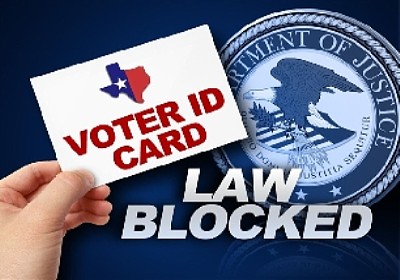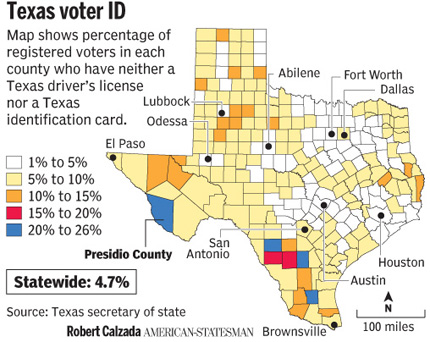On Wednesday, Aug. 5th the 5th Circuit of the US Court of Appeals struck down major portions of the Texas Voter ID law for violating the Voting Rights Act.
While the ruling was a win for opponents to the Voter ID laws, the three judges unanimously disagreed with the lower courts assertion that it amounted to a “poll tax”. Instead, they simply recognized that the number of elderly, women, and poor (who are disproportionately minority) voters that are disenfranchised by the law is an unacceptable sacrifice and amounts to discrimination.
Next, the Court will judge whether this was an intentional move on the part of the law-makers.
Facts About Those Disenfranchised by the Texas Voter ID Law
Supporters of the law argue that it thwarts voter fraud. Unfortunately, the only kind of voter fraud that is affected by the law is in-person voter fraud. All types of voter fraud is rare, but in-person voter fraud is the rarest. This type of fraud is also the least likely to accomplish anything since it requires a person (or persons) to actually go to the voting polls and cast a vote impersonating another person.
Around 600,000 registered Texas voters don’t have one of the limited forms of ID that the law allows, according to evidence presented in the legal challenge to the law, which was brought by civil rights groups and the Justice Department… Texas has been able to point to just two fraudulent votes since 2000 that would have been prevented by the ID law. MSNBC
The law itself did not single out minority groups, the elderly, or the poor. The implications, however, disproportionately affected these groups.
- Many elderly individuals lacked approved types of identification, lack the financial and other means to obtain such IDs, and some even lack the documents required: like a certified copy of their birth certificate (which costs money and, ironically, often requires a photo ID to get).
- Traditionally, women change their last names with marriage and many change them back again in cases of divorce. If their lasts names don’t match their ID… Getting your name changed on your ID requires a certified copy of marriage or divorce from the courts. They cost money, it takes time, and many courts have limited hours of operation for their records services.
- The largest group of individuals that lack the IDs required by the law are the poor. In texas the poor. They lack the financial means, the documentation, the transportation, and often the time. The working poor in rural communities would have a particular disadvantage: having to take time off work and/or travel to get paperwork.
- As much as 36.9% of voters in Texas with Spanish-surnames lacked the approved types of ID.
- As much as 17.9% of African American voters lacked the approved ID.
Editorial Notes
This is a big step forward in righting the wrong of these strict Voter ID laws. Many states still have these discriminatory types of Voter ID laws still in play, but hopefully this is a step forward. Greg Abbott has vowed to continue to beat this dead horse in Texas, but now has few avenues left for making it happen. Ultimately, these laws are ineffective at dealing with the majority of cases of actual voter fraud and the sooner their supporters stop wasting time defending them, the faster we can move forward towards legislation that empowers eligible voters to participate. Because voter fraud is actually extremely rare, better eligible voter turnout might be the best way to thwart it.

